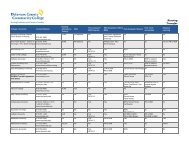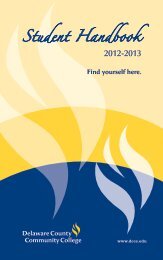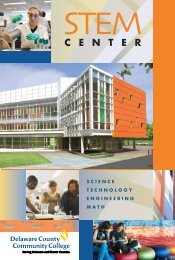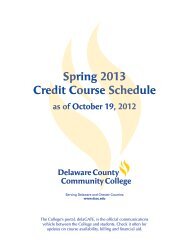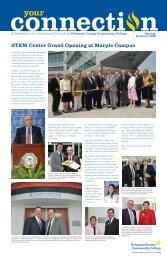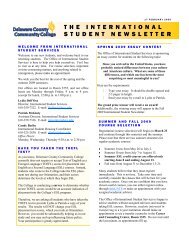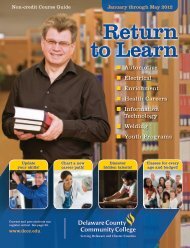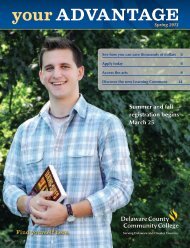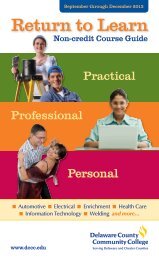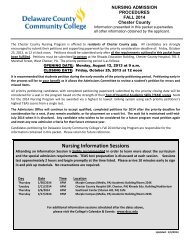2010 Catalog - Delaware County Community College
2010 Catalog - Delaware County Community College
2010 Catalog - Delaware County Community College
You also want an ePaper? Increase the reach of your titles
YUMPU automatically turns print PDFs into web optimized ePapers that Google loves.
COURSE DESCRIPTIONS 157<br />
• Demonstrate critical judgement and analytical thought<br />
in writing.<br />
• Apply interpretive and inferential analysis in order to<br />
read critically.<br />
• Evaluate persuasive and argumentative reasoning.<br />
Prereq. ENG 050, REA 050 or pass test<br />
3 Credits 3 Weekly Lecture Hours<br />
(RTH) Respiratory Therapy<br />
RTH 100 Respiratory Therapy<br />
Principles I<br />
This course is designed for students majoring in<br />
respiratory therapy. This course provides the foundation in<br />
science required to apply the principles of respiratory care.<br />
The course begins with the study of the physics principles<br />
essential to respiratory care. An in-depth study of the<br />
anatomy and physiology of the cardiopulmonary system<br />
follow this. Finally additional topics related to the practice<br />
of respiratory care are presented.<br />
Upon successful completion of this course students<br />
should be able to:<br />
• Discuss the principles of physics as related to<br />
respiratory care.<br />
• Discuss the cardiopulmonary anatomy and physiology.<br />
• Describe acid-base physiology and compensatory<br />
mechanisms.<br />
• Discuss the concepts of team approach and patienttherapist<br />
interaction.<br />
• Recall the history and purpose of respiratory therapy.<br />
• Discuss legal and ethical concepts basic to respiratory<br />
therapy.<br />
• Discuss the indications for oxygen delivery.<br />
• Describe the complications involved in oxygen delivery.<br />
• Recall the differences between the oxygen<br />
delivery devices.<br />
• Communicate using medical terminology.<br />
Prerequisite: CHE 100<br />
Co-requisite: BIO 150, RTH 101<br />
4 Credits 4 Weekly Lecture Hours<br />
RTH 101 Respiratory Therapy<br />
Practicum I<br />
Students are guided and directed by an instructor in the<br />
laboratory. This reinforces the principles taught in RTH 100<br />
utilizing the laboratory approach. Assignments applying<br />
the principles of physics and chemistry essential to respiratory<br />
care will be performed in the simulation lab. Models<br />
and computer simulation will be utilized when appropriate.<br />
Upon successful completion of this course students<br />
should be able to:<br />
• Apply the principles of physics in the clinical situation.<br />
• Apply principles of pulmonary anatomy and physiology<br />
in the clinical situation.<br />
• Apply his/her knowledge of acid-base physiology to the<br />
clinical setting.<br />
• Apply principles of team approach and concepts of<br />
appropriate patient-therapist interaction to patient care.<br />
• Administer medial gas therapy utilizing the appropriate<br />
equipment for the patient's medical condition.<br />
• Modify medical gas therapy based upon patient<br />
response to treatment.<br />
• Ensure the accurate delivery of medical gas<br />
concentrations.<br />
• Troubleshoot medical gas delivery devices.<br />
Coreq. RTH 100, BIO 150<br />
4 Credits 12 Weekly Laboratory Hours<br />
RTH 102 Respiratory Therapy<br />
Principles II<br />
This course provides students with the information<br />
necessary to safely administer aerosolized respiratory<br />
drugs. The student will learn the method of action of the<br />
drugs used to treat respiratory diseases and proper<br />
dosages and frequency of administration. The student<br />
will understand the indications for mechanical ventilation<br />
as well as the monitoring of critically ill adult patients<br />
requiring ventilatory support. Complications involved in<br />
positive pressure ventilation will be reviewed. This<br />
course also covers the methods involved in removal of<br />
patients from mechanical ventilators.<br />
Upon successful completion of this course, students<br />
should be able to:<br />
• The student will have a basic knowledge of how drugs<br />
are administered<br />
• The student will be able to explain the mechanism of<br />
action for respiratory drugs<br />
• The student will be able to identify the basic functions<br />
of mechanical ventilators<br />
• The student will be able to describe why patients may<br />
require ventilatory support<br />
• Discuss the importance of monitoring patients requiring<br />
ventilatory support<br />
• Describe when and how to successfully wean a patient<br />
from mechanical ventilation<br />
Prereq. RTH 101, BIO 150 Coreq. RTH 103, BIO 151<br />
2 Credits 2 Weekly Lecture Hours<br />
RTH 103 Respiratory Therapy<br />
Practicum II<br />
This course provides students with the knowledge and<br />
motor skills necessary to deliver oxygen therapy bronchopulmonary<br />
hygiene airway management and ventilator<br />
management to the adult patient.<br />
Upon successful completion of this course, students<br />
should be able to:<br />
• Recommend respiratory care based on evaluation of a<br />
patient's medical history, physical examination and<br />
diagnostic studies.<br />
• Perform cardiopulmonary resuscitation according to the<br />
protocols of the American Heart Association.<br />
• Ensure the safety of patients and staff by adhering to<br />
infection control standards.<br />
• Deliver bronchopulmonary hygiene therapies and<br />
modify according to the patient's response.<br />
• Perform arterial and puncture.<br />
• Maintain a patent airway.<br />
• Manage ventilation of adult patients in the<br />
simulation laboratory.<br />
Prereq. RTH 100, RTH 101, BIO 150 Coreq. RTH 102, BIO<br />
151<br />
6 Credits 12 Weekly Laboratory Hours<br />
RTH 104 Respiratory Therapy<br />
Summer Clinical I<br />
This course is a supervised clinical practice.<br />
Upon successful completion of this course, students<br />
should be able to:<br />
• Administer bronchopulmonary hygiene and modify<br />
therapy based on patient response.<br />
• Analyze and ensure accurate resulting of various types<br />
of samples to determine cardiopulmonary function.<br />
• Administer bronchopulmonary hygiene and ventilatory<br />
support to critically ill adult patients.<br />
• Assist physicians with special procedure and<br />
communicate effectively with physicians.<br />
Prereq. RTH 102 and RTH 103<br />
5 Credits<br />
RTH 105 Respiratory Therapy<br />
Summer Clinical II<br />
This course is a supervised clinical practice.<br />
Upon successful completion of this course, students<br />
should be able to:<br />
• Administer bronchopulmonary hygiene and modify<br />
therapy based on patient response.<br />
• Appreciate the role of anesthesia in the practice of<br />
respiratory care.<br />
• Administer bronchopulmonary hygiene and ventilatory<br />
support to critically ill adult patients.<br />
Prereq. RTH 102 and RTH 103<br />
5 Credits<br />
RTH 200 Respiratory Therapy<br />
Principles III<br />
In this course students will study advanced topics in<br />
respiratory care including cardiovascular and renal<br />
physiology and the specialties of pulmonary function<br />
testing and pediatrics.<br />
Upon successful completion of this course, students<br />
should be able to:<br />
• Analyze tests of pulmonary function and modify<br />
therapies based upon results.<br />
• Apply the principles of respiratory care, cognizant of the<br />
special physiologic and pathophysiologic processes of<br />
the neonatal and pediatric patient.<br />
• Describe fundamental principles of normal renal<br />
physiology.<br />
• Describe fundamental principles of normal<br />
cardiovascular physiology.<br />
Prereq. RTH 105 Coreq. RTH 201, RTH 204<br />
3 Credits 3 Weekly Lecture Hours<br />
RTH 201 Respiratory Therapy Clinical<br />
Practicum III<br />
This course is a supervised clinical practice.<br />
Upon successful completion of this course, students<br />
should be able to:<br />
• Administer bronchopulmonary hygiene, invasive and<br />
non-invasive ventilation and cardiopulmonary<br />
resuscitation in the Emergency Room setting.<br />
• Perform pulmonary function testing and analyze results<br />
to ensure appropriateness of respiratory care.<br />
• Administer bronchopulmonary hygiene and ventilatory<br />
support to critically ill adult patients.<br />
• Assist physicians with patient assessment, special<br />
procedure and communicate effectively with physicians.<br />
Prereq. RTH 105 Coreq. RTH 200, RTH 204<br />
6 Credits 12 Weekly Laboratory Hours<br />
RTH 202 Respiratory Therapy<br />
Principles IV<br />
This course includes the study of advanced cardiovascular<br />
and renal physiology and pathophysiology,<br />
and treatment regimens that impact respiratory care.<br />
Upon successful completion of this course, students<br />
should be able to:<br />
• Discuss the basic principles of pharmacology, drug<br />
administration methods, drug action and side effects<br />
with emphasis on respiratory and cardiovascular systems.<br />
• Discuss the principles of fluid and electrolyte balance<br />
and how it relates to the respiratory system.<br />
• Describe the principles of cardiac and hemodynamic<br />
monitoring.<br />
• Research and present a paper on an area or concept<br />
of respiratory therapy in the area of techniques<br />
equipment, or respiratory physiology.<br />
Prereq. RTH 201 Coreq. RTH 203, RTH 205<br />
3 Credits 3 Weekly Lecture Hours




